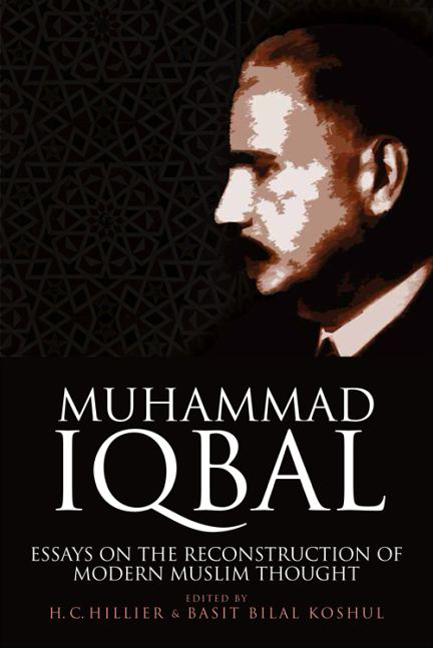Book contents
- Frontmatter
- Contents
- Preface
- 1 Introduction
- 2 The Human Person in Iqbal's Thought
- 3 Achieving Humanity: Convergence between Henri Bergson and Muhammad Iqbal
- 4 The Contemporary Relevance of Muhammad Iqbal
- 5 Pragmatism and Islam in Peirce and Iqbal: The Metaphysics of Emergent Mind
- 6 Between Hegel and Rumi: Iqbal's Contrapuntal Encounters with the Islamic Philosophical Traditions
- 7 Reconstructing Islam in a Post-metaphysical Age: Muhammad Iqbal's Interpretation of Immortality
- 8 Iqbal, Bergson and the Reconstruction of the Divine Nexus in Political Thought
- 9 Muhammad Iqbal: Restoring Muslim Dignity through Poetry, Philosophy and Religious Political Action
- Index
6 - Between Hegel and Rumi: Iqbal's Contrapuntal Encounters with the Islamic Philosophical Traditions
Published online by Cambridge University Press: 10 October 2017
- Frontmatter
- Contents
- Preface
- 1 Introduction
- 2 The Human Person in Iqbal's Thought
- 3 Achieving Humanity: Convergence between Henri Bergson and Muhammad Iqbal
- 4 The Contemporary Relevance of Muhammad Iqbal
- 5 Pragmatism and Islam in Peirce and Iqbal: The Metaphysics of Emergent Mind
- 6 Between Hegel and Rumi: Iqbal's Contrapuntal Encounters with the Islamic Philosophical Traditions
- 7 Reconstructing Islam in a Post-metaphysical Age: Muhammad Iqbal's Interpretation of Immortality
- 8 Iqbal, Bergson and the Reconstruction of the Divine Nexus in Political Thought
- 9 Muhammad Iqbal: Restoring Muslim Dignity through Poetry, Philosophy and Religious Political Action
- Index
Summary
The colonial period in British India witnessed the rise of different responses articulated by religious communities to both their traditions of scriptural and vernacular knowledge systems as well as attempts to make sense of how modernity challenged their practices, modes of life, and epistemologies of the cosmos that they inhabited. In effect, all of these responses were incubated in the laboratory of imperial modernity – new political systems of governance, the new science, new epistemologies and pedagogies, print and new media, and a world opened up before them albeit within the confines of the status of imperial subjects – and perhaps in that sense it would not be incorrect to labels them all as ‘modernist’. The failure of the old elites to resist the imperial powers – and the ongoing issue of whether the success of the colonisers was somehow linked to their ‘muscular Protestantism’ – led to a rethinking of traditions and their refashioning in the image of the conqueror (van der Veer 2001; Viswanathan 1989; Prakash 1999). The development of the field of Islamic intellectual history in South Asia has brought out in particular five or six such responses – and captured the interest of the subject of this volume and of this chapter (for example, Muhammad Iqbal) who had a relationship in some way or the other with each of them: the return to scripturalism and in particular to the texts that portrayed the Prophetic way of life (the hadith) in Deoband (India) from 1867, the reaffirmation of the vibrancy and relevance of traditional devotion to the Prophet and Sufi piety of the movement of Aḥmad Riżā Khān of Bareilly (India), the alternative scripturalism of the ahl al-Qur’ān in the Punjab (India), the Aligarh movement and its embrace of a new colonial elite fashioned on the playing-fields of Eton and in the quadrangles of Oxford (United Kingdom), the struggle of survival of the old Shi'a nawabi elites of Avadh to retain status and their epistemologies, and the ‘new faiths’ such as the Aamadī movement with their desire to link reform and reconciliation with modernity through a recourse to an old notion of ‘prophecy continuous’ (Metcalf 1982; Sanyal 1996; Qasmi 2011; Lelyveld 1978; Jones 2012; Friedman 1989).
- Type
- Chapter
- Information
- Muhammad IqbalEssays on the Reconstruction of Modern Muslim Thought, pp. 112 - 141Publisher: Edinburgh University PressPrint publication year: 2015

